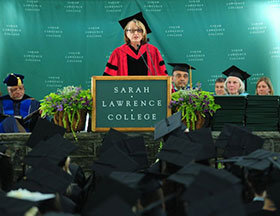 Thank you, Karen, it has been extraordinary to serve with you…the president who can, while on a return flight from a fundraising gala in Beijing, decipher both the densest excel spread sheets and the most opaque passages of James Joyce’s Ulysses with equal and uncanny facility.
Thank you, Karen, it has been extraordinary to serve with you…the president who can, while on a return flight from a fundraising gala in Beijing, decipher both the densest excel spread sheets and the most opaque passages of James Joyce’s Ulysses with equal and uncanny facility.
It has been an enormous honor to be Dean of Sarah Lawrence College, the most important job I have ever had in a long career in higher education. But I am now headed deep into the heart of Sarah Lawrence, and the heart of Sarah Lawrence means teaching. For four decades, I have taught in both public institutions and in private, elite institutions, often with extremely dedicated professors. But I have worked at no school at which teaching is conducted with the brilliant reflection with which it happens here, no place where it is more thoughtful or active or alive as an enterprise. I am thrilled to enter this distinguished faculty.
Which leads me to this: I want to talk to you just for a moment about conferencing, probably the last time ANYONE will want to talk to you about conferencing (and by the way NO ONE out there will EVER understand this term again..don't even try to use it). Nevertheless, I want to remind you to continue doing it, continue conferencing. Now, I am not suggesting that you call up Bill Shullenberger next October and demand biweekly alumni conferences, though heaven knows he would probably do it if you asked… (don’t do it). I want you to think instead of the nature of the exchange that happens in conferencing, and in all of the pedagogies practiced here—the one on one conversation, the deep listening, the give and take… think of those exchanges and continue them, as a skill: the ability to conduct deep inquiring conversations that can continue to transform you. As faculty we will do the same. Do you remember when you were first-years, I told you that one of the things that made teaching unique here was that professors teach their interests, and engage with you at a level that is creative and challenging for both parties, even productive? That is how Michael Davis has written 11 books; those were courses before they were books, and he explored those topics conferencing with you. Lizzie Johnston and Leah Olson's book, The Feeling Brain, grew out of a seminar with you. Colin Abernathy has co-authored chemistry papers with some of you, and Kevin Confoy brought work you did with him to the stage. Charlotte Doyle constructed a scholarly article about the psychology of the creative process based on a single question a student asked in conference.
What I am saying is that conferencing didn't just change you: it changed both parties. You both listened, opened to the questions of the other. You received and acted on challenges, and you both changed incrementally, grew not just in information and argument, but also through the transformation that occurs in the face of difference: in the face of difference in age, experience, of different cultural background, religion, gender identity and racial identity, different political convictions, social values.
In my class last fall, we had conference discussions about the Danish cartoons of the Prophet Muhammed; this was before the Charlie Hebdo attacks. In these conversations, we swam together in those equivocal waters between freedom of speech and civility. We learned to tolerate and explore our disagreements, and we saw together that mere conviction without understanding is brittle and callow.
These interactions prepare us all for conversations in a world of complex personal and political economies, of conflicting beliefs and interests; a world of no easy answers.
The ability to have such interactions is a tool you take with you into that world still unknown, along with your ability to conduct lab research, to analyze a text, along with skills learned in internships and service learning, and your capacity to write beautifully, authentically, and powerfully. With these abilities you also take away the skill to engage in deeply transformative conversations. And you are about to step into a world in which transformative conversations are urgent and crucial.. conversations between police and the loved ones of fallen black youths; conversations between citizens of Gaza and citizens of Ashkelon; conversations between refugees floating in fragile boats and the immigration officials pushing them back out to sea. Each conference here was a third space in which both parties were transformed. Pay it forward. There are no easy answers, but you are Sarah Lawrence graduates: you are fearless, and you know how to have conversations that transform you and those around you. As a Sarah Lawrence faculty member, I know you have the crucial skills. Thank You.